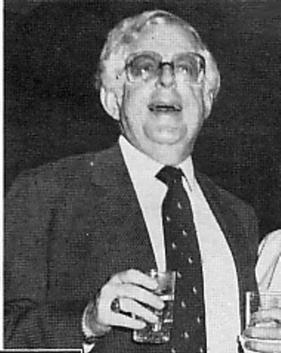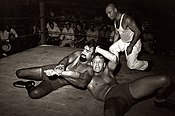
World Championship Wrestling (WCW) was an American professional wrestling promotion founded by Ted Turner in 1988, after Turner Broadcasting System, through a subsidiary named Universal Wrestling Corporation, purchased the assets of National Wrestling Alliance (NWA) territory Jim Crockett Promotions (JCP).

The National Wrestling Alliance (NWA) is an American professional wrestling promotion and governing body owned by Billy Corgan and operated by its parent company Lightning One, Inc.

Jim Crockett Promotions is a family-owned professional wrestling promotion headquartered in Charlotte, North Carolina, United States. Founded in 1931, the promotion emerged as a cornerstone of the National Wrestling Alliance (NWA). By the 1980s, Jim Crockett Promotions was, along with the World Wrestling Federation, one of the two largest promotions in the United States. The Crockett family sold a majority interest in the promotion to Turner Broadcasting System, which was acquired by Time Warner in 1996, resulting in the creation of World Championship Wrestling (WCW) in 1988. In 2022, Jim Crockett Promotions Inc. was restarted by Jim Crockett's son and Jim Crockett Jr's brother, David Crockett.

The NWA Worlds Heavyweight Championship is a men's professional wrestling world heavyweight championship owned and promoted by the National Wrestling Alliance (NWA), an American professional wrestling promotion. The current champion is EC3, who is in his first reign.

Championship Wrestling from Florida (CWF) was the corporate and brand name of the Tampa, Florida wrestling office existing from 1961, when Eddie Graham first bought into the promotion, until 1987, when it closed down. It is also referred to as Florida Championship Wrestling. When Mike Graham tried a return to promoting, the rights to the name had been acquired by an outside party, forcing him to use another name, Florida Championship Wrestling.

Noah Anthony Schiavone is an American sports announcer, professional wrestling commentator and podcaster. He is currently signed to All Elite Wrestling (AEW) where he serves as the play-by-play commentator for Collision, color commentator for Dynamite and Rampage, then also as senior producer. He has previously worked for Jim Crockett Promotions, the World Wrestling Federation, World Championship Wrestling (WCW), and Major League Wrestling (MLW). In addition to his work in wrestling, Schiavone has also worked as a broadcaster for the Gwinnett Braves/Stripers of Minor League Baseball and Georgia Bulldogs football.

James Allen Crockett Jr. was an American professional wrestling promoter. From 1973 to 1989, he was part owner of Jim Crockett Promotions (JCP), a wrestling company affiliated with the National Wrestling Alliance (NWA). From 1976 to 1987, Jim Crockett Promotions also owned the Charlotte Orioles, a minor league baseball team based in Charlotte, North Carolina as well as a short stint as the owner of the Winston-Salem Polar Twins in the Southern Hockey League from 1974 to 1975.

Georgia Championship Wrestling is an American professional wrestling promotion based in Atlanta, Georgia. The promotion was affiliated with what had been the world's top sanctioning body of championship titles for decades before, the National Wrestling Alliance (NWA), and ran live wrestling shows throughout its geographic "territory" of Georgia. The company was also known for its self-titled TV program, which aired on Atlanta-based superstation WTBS from the 1970s until 1984 when its timeslot was purchased by the World Wrestling Federation.

WCW Saturday Night is an American weekly Saturday night television show on TBS that was produced by World Championship Wrestling (WCW). Launched in 1971 initially by Georgia Championship Wrestling, the program existed through various incarnations under different names before becoming WCW Saturday Night in 1992. Although initially the anchor show of the Turner Broadcasting-backed wrestling company, the September 1995 premiere of WCW Monday Nitro airing on sister station TNT usurped the show's once preeminent position in the company, as the primary source of storyline development and pay-per-view buildup.

WCW WorldWide is an American syndicated television show that was produced by World Championship Wrestling (WCW) that aired from October 8, 1975, to March 31, 2001. At the time of its cancellation, WorldWide was the longest-running, uninterrupted weekly syndicated show of any kind on the air in the United States.

James Edward Barnett was an American professional wrestling promoter and executive. During his career, he was at times one of the owners of the Indianapolis National Wrestling Alliance promotion, Australia's World Championship Wrestling, and Georgia Championship Wrestling, as well as serving as an executive with the World Wrestling Federation and Jim Crockett Promotions/World Championship Wrestling. He also served as a member of the National Council on the Arts during the Presidency of Jimmy Carter. Barnett was inducted into the Wrestling Observer Newsletter Hall of Fame in 1996, the NWA Hall of Fame in 2005, and the WWE Hall of Fame in 2019.

Best of World Championship Wrestling is an hour-long show, that was the Sunday evening edition of TBS' Saturday night wrestling shows, Georgia Championship Wrestling and NWA World Championship Wrestling. The rights to Best of World Championship Wrestling now belong to World Wrestling Entertainment (WWE).

The 1980s professional wrestling boom was a surge in the popularity of professional wrestling in the United States and elsewhere throughout the 1980s. The expansion of cable television and pay-per-view, coupled with the efforts of promoters such as Vince McMahon, saw professional wrestling shift from a system controlled by numerous regional companies to one dominated by two nationwide companies: McMahon's World Wrestling Federation and Ted Turner's World Championship Wrestling (WCW). The decade also saw a considerable decline in the power of the National Wrestling Alliance (NWA), a cartel which had until then dominated the wrestling landscape, and in the efforts to sustain belief in the kayfabe of wrestling.

Freddie G. Miller was a broadcaster and television personality in Atlanta, Georgia, United States. Miller worked for Atlanta television station WXIA-TV from the 1950s to the 1970s. His greatest exposure and notoriety came in the years following, for his role on the announcing team of professional wrestling programs broadcast on another Atlanta station, WTBS.

WWE Libraries Inc., branded as the WWE Legacy Department, is an American media company that consists of the largest collection of professional wrestling videos and copyrights in the world. The Legacy Department is a subsidiary of WWE, the professional wrestling subsidiary of TKO Group Holdings. It comprises not only past and current works by WWE but also the works of now defunct professional wrestling promotions dating back to the 1930s. As of 2014, the library stands at 150,000 hours of content including weekly television shows, pay-per-views, and recorded house shows. The collection represents a very significant portion of the visual history of modern professional wrestling in the United States and Canada. WWE has made their classic holdings available through numerous home video releases, the Vintage television program, and on the WWE Network and WWE Classics on Demand services.

Professional wrestling in the United States, until the 1920s, was viewed as a legitimate sport. This view did not endure into the 1930s, as professional wrestling became identified with modern theatrics. The scripted nature of the art has made some critics view it as an illegitimate sport, particularly in comparison to boxing, mixed martial arts, and amateur wrestling. No major promoter or wrestler denies that modern professional wrestling has predetermined match outcomes. Despite this, promoters and fans continued to play along with the tradition of viewing the matches as legitimate competition; this has become a tradition known as "kayfabe".

World Championship Wrestling (WCW) was an American professional wrestling promotion that existed from 1988 to 2001. It began as a promotion affiliated with the National Wrestling Alliance (NWA) that appeared on the national scene under the ownership of media mogul Ted Turner and based in Atlanta, Georgia. Prior to the launch of WCW as a separate promotion, the "World Championship Wrestling" name was used for a television program produced by NWA promotions Georgia Championship Wrestling and Jim Crockett Promotions on TBS; the name came from an Australian wrestling promotion of the 1970s.

The Monday Night War or the Monday Night Wars, was an era of mainstream televised American professional wrestling, from September 4, 1995 to March 26, 2001, in which the World Wrestling Federation's Monday Night Raw and World Championship Wrestling's (WCW) Monday Nitro were broadcast opposite each other in a battle for Nielsen ratings each week. It largely overlapped with the Attitude Era, a period in which the WWF used the term "WWF Attitude" to describe its programming from November 9, 1997 to May 6, 2002.
The following is a historical overview television coverage provided the National Wrestling Alliance's territories. The NWA began in 1948 as a governing body for a group of independent professional wrestling promotions.

















